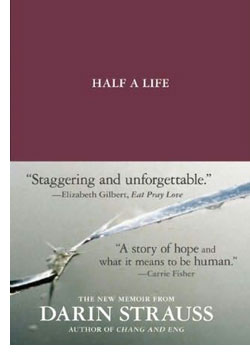 |
 |
 Darin Straus
Darin Straus
Half a Life
Reviewed by: Rick Kleffel © 2010
McSweeney's
USA Trade Hardcover, First Edition
ISBN 978-1-934781-70-8
Publication Date: 09-15-2010
311 pages, $24
Date Reviewed: 10-11-2010
Index:
Non-Fiction
The facts are simple. At the age of eighteen, Darin Straus accidentally killed a classmate, when, while riding a bicycle, she swerved in front of his car. There was nothing he could do to prevent the accident. It was not his fault. She died after being taken to the hospital.
While the facts are simple, nothing else is. Straus was a teenager, and emotionally ill-equipped to deal with what had happened. Even a well-balanced, mature adult would find such an accident problematic. Straus went on to write some excellent, acclaimed novels, including 'Change and Eng' and 'More Than It Hurts You.' But he rarely told those in his life what had happened to him. 'Half A Life' is the story of his accident, his story. By turns harrowing and beautiful, poetic and powerful, 'Half A Life' is ultimately a rewarding, engrossing vision of a mind stunned but not stunted by grief.
The prose, the presentation, the punctuation, and even the layout of 'Half A Life' are sparse and stripped-down. Straus expertly evades all the potential traps of such a work, including the temptation to strip out all emotion. Every word seems perfectly placed, and this care gives the prose, to some degree, the feel of poetry. But don't mistake that to mean there is some sort of flowery or "artistic" aspect to the writing. The book is very, very easy to read, no matter how resistant you might yourself to be to the subject. There is nothing here but pure storytelling and precise observation. What remains is a gripping, almost clinical study of how an unformed mind copes with a tragic accident.
Though Straus tells the story of eighteen years of his own life, this doesn't read like a memoir or an autobiography. Readers will realize quite early on that Straus has set himself the very difficult task of creating himself, in his youth, as a character. To that end, there's a sense of balance and objectivity that pervades the story. Straus doesn't cut himself any slack and he doesn't indulge in nostalgia or sentiment. But he does not castigate or criticize his past self either. We know that the author of the book (and one tends to think of it as a novel though it is not) is a different person from the character of Darin Straus, ages eighteen through thirty-six. The author has compassion for his main character, and deep insight — but the prose construct is not writing the book. There's a very scientific feel to the portrayal of the main character, Darin Straus.
This is true for the others who play parts in the book as well, though they are clearly not the focus of the work. Darin's parents, his friends, his therapists, and the girl's parents are all dialed back. We see them, briefly, from the outside. Straus never presumes to know what they are thinking, and to a degree, he doesn't care, and neither do we as readers. 'Half a Life' really does feel like a clinical character study.
Though the book focuses on Darin, it's not solipsistic or narcissistic in any way. 'Half a Life' covers those eighteen years in about 200 very small-size pages. If that seems short, it is. Eighteen years of anyone's life might reasonably seem to require more words than Straus supplies, but this book is a very plot-driven story focusing on the effect of the accident. Everything that is not related to the accident is left behind. This does not mean the book consists entirely of self-description. There's quite a bit of what in a novel would be called plot. The follow-on to the accident is not what readers or Straus himself expect. And there is, in the clinical perspective, a finely honed sense of the absurd that is occasionally rather funny. The feel of the book is well modulated. It's powerful but never over-powering. This is a surprisingly fun book to read, especially given the nature of the subject.
Straus himself is careful to point out that in life, epiphanies are rare. And there are no overtly "magic moments" to be found in 'Half a Life.' But the prose is so perfectly plain that there are literally hundreds of sentences readers will remember, and hundreds more that they will want to remember. This is a book that is very easy to go back and visit in your memory, a book that you can enjoy after reading without re-reading. It's also the sort of book that is so easy to read in the first place, that reading it again is something you might well look forward to. If you're looking for a clear-eyed, informative and practically helpful guide to grief, look no further. By not pretending or even attempting to offer advice, Straus offers those in need of solace (and everyone else) something infinitely more valuable. Company.
|
 |
|
|
 |
| |
Review Archive
All Reviews alphabetized by author.
General Fiction
Non-Genre, general fiction and literature.
Horror
Supernatural fiction, supernatural horror and non-supernatural horror.
Science Fiction
Science fiction, science fantasy, speculative fiction, alternate history.
Fantasy
Fantasy, surrealism and magic realism.
Mystery
Crime, thrillers, mystery, suspense.
Non-Fiction
Non-Fiction, True Crime, Forteana, Reference.
Poetry
|
|
 |
|




